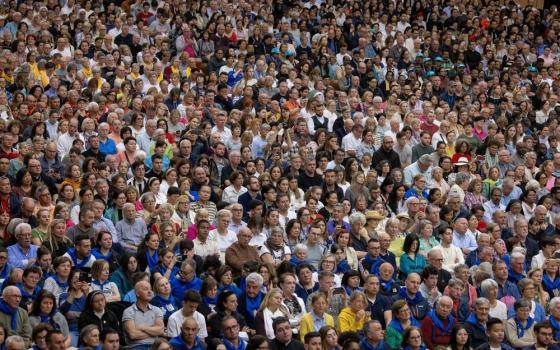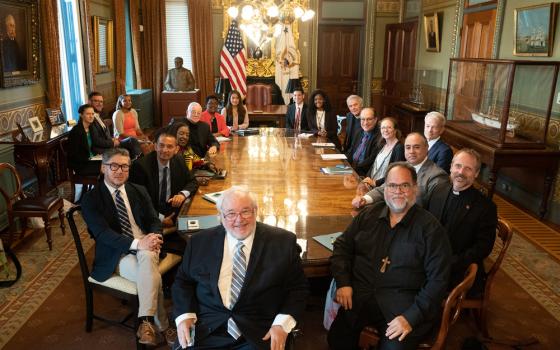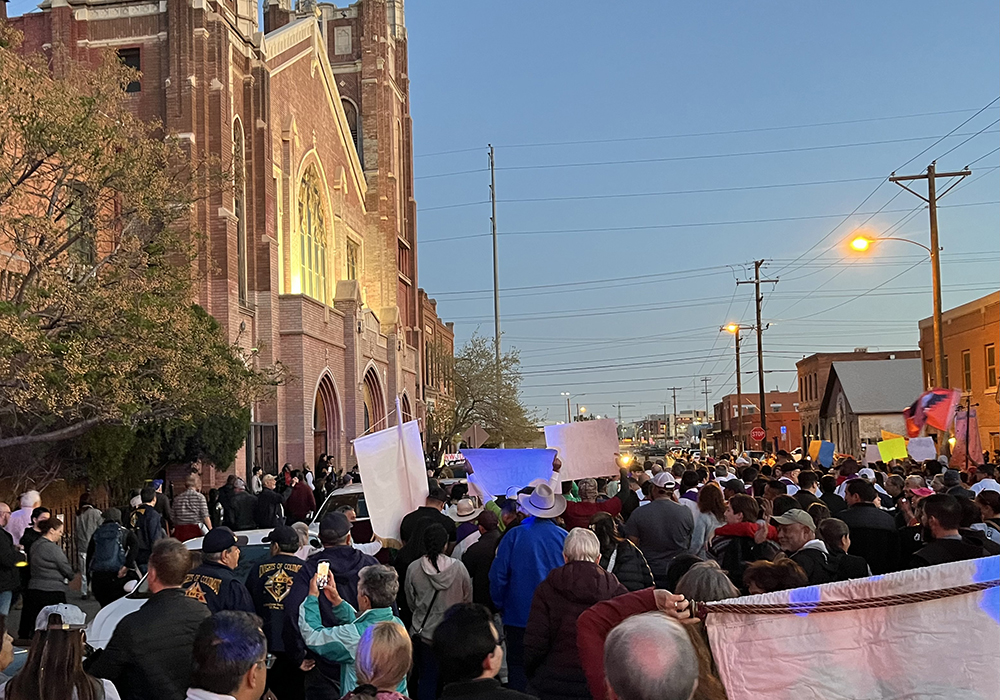
Participants in El Paso's "Do Not Be Afraid: March and Vigil for Human Dignity" await entry into Sacred Heart Catholic Parish, where a vigil was being held to mark the one-year anniversary of the 2023 Ciudad Juarez migrant detention center fire. (Evan Bednarz)
In El Paso, Texas, Stanton Street runs north-south over Interstate 10. A few blocks north, there is the Catholic boys' high school, a student body mixing Mexicans and Americans, boys who come from wealth and those on scholarship. South of the interstate, Stanton traverses downtown, eventually becoming Stanton-Lerdo Bridge, one of the major ports of entry between Ciudad Juarez, Mexico, and El Paso. Each day, tens of thousands enter El Paso for work and family. Adding to those numbers are the hundreds to thousands of migrants detained and released into El Paso daily.
Across the border, Stanton becomes Avenida Lerdo, which was the location of a migrant detention center. In March 2023 a fire broke out at the center, killing 40 and injuring dozens more. On March 21, 2024, approaching the one-year anniversary of the fire, hundreds gathered in San Jacinto Plaza at the heart of downtown El Paso, the starting point for the "Do Not Be Afraid: March and Vigil for Human Dignity" commissioned by the Diocese of El Paso, Texas, and the Hope Border Institute, a local Catholic nongovernmental organization, and others.
Several groups of matachines (ritual dancers) were spread around the plaza, eye-catching in their bumblebee black-and-gold or sunset red dresses, their drums occasionally booming. Someone held a handmade sign that read, "Todos Somos Inmigrantes," ("We Are All Immigrants") illustrated with a black-marker drawing of the Holy Family as migrants. The evening was sunny, with a touch of coolness in the breeze.
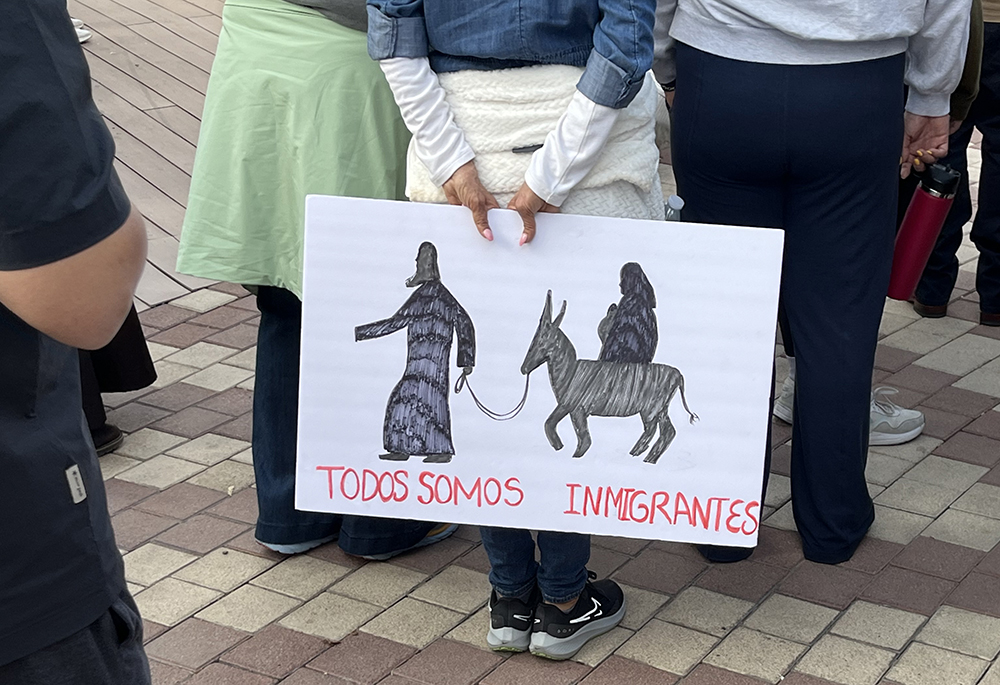
At San Jacinto Plaza in El Paso, Texas, a participant in the march and vigil holds a sign that reads, "We Are All Immigrants." (Evan Bednarz)
This year's gathering was about remembrance of the past and protest of the present: along with the one-year anniversary of the migrant center fire, a protest of current anti-migrant legislation.
Texas Senate Bill 4, or SB 4, originally was set to take effect March 5, which would give municipal and state police discretionary authority to detain those suspected of illegal entry into the U.S. as well as expedite the deportation process within the courts. This was the latest salvo of border legislation from Gov. Greg Abbott, aimed at what he has seen as President Joe Biden's ineffective attempts to secure the border at the federal level. At the time of this writing, SB 4 is locked up in a federal court of appeals.
In February of this year, the Texas attorney general attempted to shut down Annunciation House, an iconic El Paso institution that has been offering Christian hospitality to migrants since 1978. The AG's office accused it of "human smuggling" and "operating a stash house."
The march and vigil began with technical difficulty: the single megaphone did not work, so most speakers were drowned out by ambient noise, including Ruben Garcia, the soft-spoken face, founder and director of Annunciation House, whose recent prominence had caused him to be profiled in The New Yorker. Episcopal Bishop Michael Hunn of Rio Grande, one of few speakers audible, ended his remarks, "We won't let the government decide who we can and can't offer hospitality to."
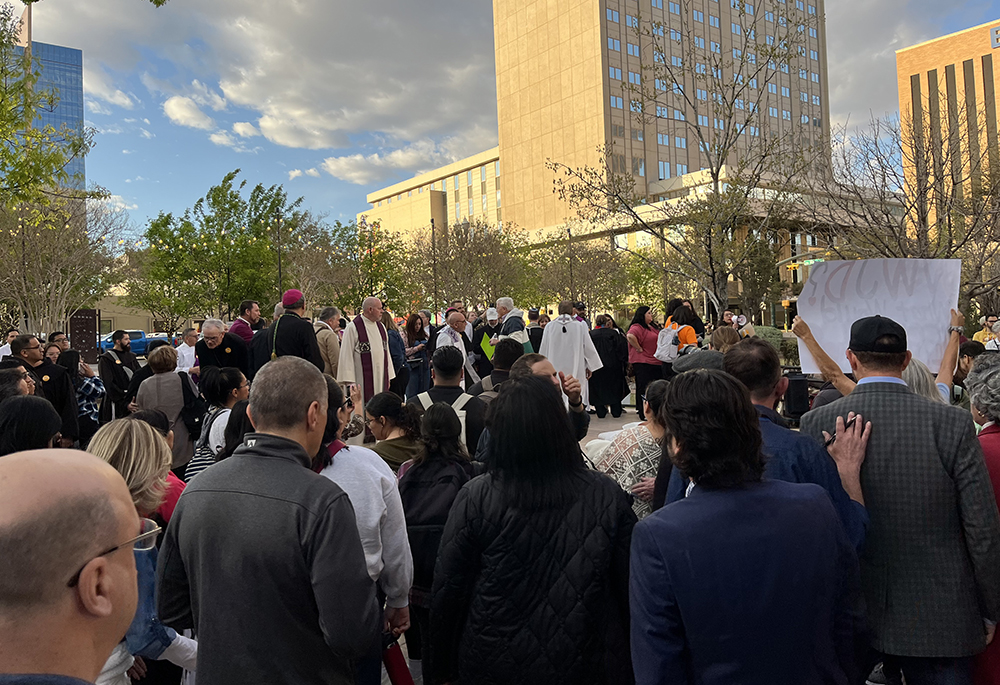
Ruben Garcia of Annunciation House, center, is pictured at the "Do Not Be Afraid: March and Vigil for Human Dignity" in El Paso, Texas, protesting Texas Senate Bill 4, or SB 4. (Evan Bednarz)
The collective drums of the matachines boomed as the march moved toward the site of the vigil, the Jesuit parish of Sacred Heart. Clergy marched in step, holding a banner, following the smoke of incense and the crossbearer. A young woman and a young man in wheelchairs were carefully pushed into the stream of procession by their helpers as chants rose above the noise and then receded. The pilgrims advanced as the sun was going down, and by the time we reached Sacred Heart a half-mile away, hundreds were awaiting entry outside the church and the sky was darkening into dusk.
The nave quickly filled up, so people ascended to the balcony. In the back of the balcony, two young men worked enthusiastically on their sign, graffiti-styled and reading, "Anarkists and Catholics UNITE." This was not out of place for a gathering inspired by the lights of Dorothy Day and St. Oscar Romero.
An icon of the saint lay next to the altar, reverenced with incense and flowers, and his words were read: "We cannot segregate God's word from the historical reality in which it is proclaimed. … We have never preached violence, except the violence of love, which left Christ nailed to a cross." For preaching the violence of love and taking up his cross, Romero was shot through the heart.
In reading Romero alongside the names of the 40 who died in the Juarez fire, the vigil showed itself as a collective invocation of the cross — a Word confronting all present in this historical moment, something that, in Romero's words and witness, might have to be borne violently in love. This message was quickly brought home when Ruben Garcia came up, spoke, then helped someone else to the podium — it was the young man in the wheelchair I'd seen earlier. His name was Wilson Alexander Juarez Hernandez, and he was one of the survivors of the migrant center fire. He received a standing ovation. Due to facial wounds from the fire, he spoke a muffled, garbled Spanish, of which I understood little to none.
However, that was not the reason Juarez received a standing ovation before and after his words. St. Paul wrote to the Corinthians, "When I came to you, brothers, I did not come with eloquence or human wisdom. … For I resolved to know nothing while I was with you except Jesus Christ and him crucified" (1 Corinthians 2:1-2). It was not for Juarez's eloquence or wisdom that hundreds had gathered and were standing to applaud; it was that he had witnessed to the cross so explicitly in the historical moment all in Sacred Heart shared, so that his presence there at the altar became something iconographic: an icon of the hopes and fears of the countless migrants who had passed through El Paso, those waiting anxiously in detention camps, those who never made it. It was a powerful counterimage to the often-demonizing anti-migrant rhetoric.
Advertisement
But if we press this notion of iconography further, then Mr. Juarez, the migrant fire and SB 4 become more than the pain of distant others or political issues separating right from left. It becomes the very form of the crucified Word speaking to us in this historical moment. Would we listen?
During his remarks El Paso Bishop Mark Seitz said that it has always been Christians who have stood by the side of the dispossessed. Would we prove it? We do not choose our cross, it chooses us and so for those of us applauding in that El Paso church or those across the country who read in the headlines about the border crisis 'over there' on the borders Texas or Arizona, a simple question arose: Are we willing to practice the violence of love, whatever that might entail?
However we might answer, it would be crucial to recognize what Ruben Garcia said in The New Yorker profile, as mayors of northern metropolises like Chicago and New York struggle to respond to migration issues in their cities. "All of us have skin in this game."








